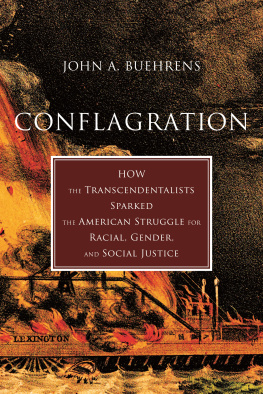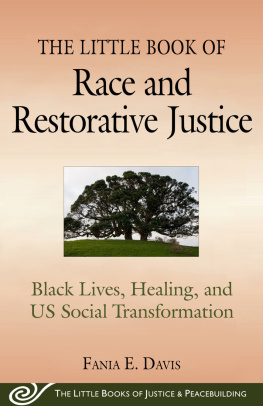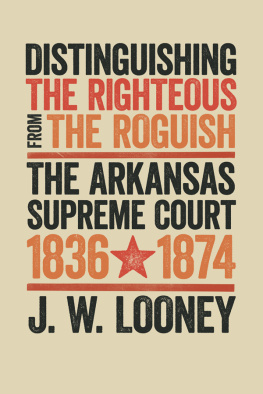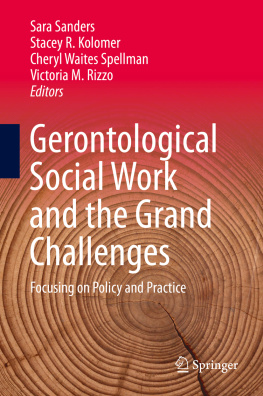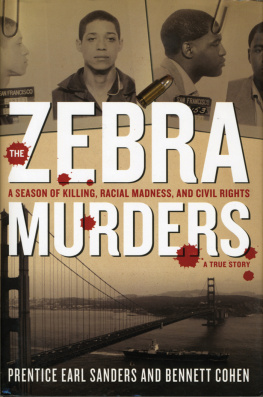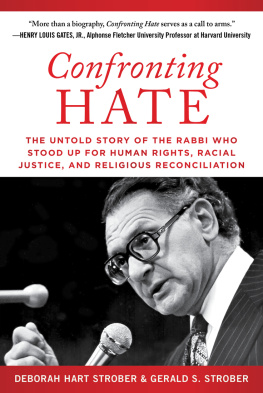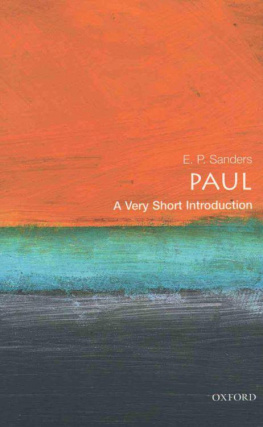Copyright 2018 by The University of Arkansas Press
All rights reserved
Manufactured in the United States of America
ISBN: 9781682260753
e-ISBN: 9781610756518
22 21 20 19 18 5 4 3 2 1
Designer: April Leidig
The paper used in this publication meets the minimum requirements of the American National Standard for Permanence of Paper for Printed Library Materials Z39.481984.
Library of Congress Control Cataloging-in-Publication Data
Names: Moses, James L., 1960- author.
Title: Just and righteous causes : Rabbi Ira Sanders and the fight for racial and social justice in Arkansas, 19261963 / James L. Moses.
Description: Fayetteville : University of Arkansas Press, 2018. |
Identifiers: LCCN 2018034904 (print) | LCCN 2018037470 (ebook) | ISBN 9781610756518 (electronic) | ISBN 9781682260753 (hardback)
Subjects: LCSH: Sanders, Ira E. | RabbisArkansasBiography. | African AmericansRelations with JewsHistory. | African AmericansCivil rightsArkansasHistory20th century. | ArkansasBiography. | BISAC: BIOGRAPHY & AUTOBIOGRAPHY / Religious. | HISTORY / United States / State & Local / South (AL, AR, FL, GA, KY, LA, MS, NC, SC, TN, VA, WV). | SOCIAL SCIENCE / Discrimination & Race Relations.
Classification: LCC BM755.S244 (ebook) | LCC BM755.S244 M67 2018 (print) | DDC 296.8/341092 [B]dc23
LC record available at https://urldefense.proofpoint.com/v2/url?u=https-3A__lccn.loc.gov_2018034904&d=DwIFAg&c=7ypwAowFJ8v-mw8AB-SdSueVQgSDL4HiiSaLK01W8HA&r=4fo1OqKuv_3krqlYYqNQWNKNaWxXN20G1PCOL-2ERgE&m=U397ap21k9hC2l-D_cd9NYTwc_cnUmR5pP3te_dkT8Q&s=aYROyc3oYath6ok1pXCArJalZj8r0Yw8u1QYCxn5ve8&e=
There is in my heart as it were a burning fire shut up in my bones, and I weary myself to hold it in, but cannot.
JEREMIAH 20:9
The effective rabbi sees his reward only in the changed attitudes and social activism in behalf of just and righteous causes.
IRA SANDERS
ACKNOWLEDGMENTS
LIKE EVERY WRITER OF HISTORY, I have many people to thank for their role in the production of this book. Arkansas Tech University provided support at every stage of this project with a research grant, travel monies, and particularly a sabbatical leave that allowed me time to complete the manuscript. Thanks to Jeff Woods and David Blanks, my dean and department head, for their enthusiastic support in the completion of this project, and for occasionally acting as very effective sounding boards for me. My good friend and colleague Peter Dykema has listened to too many stories about Ira Sanders, and through his friendship, his moral support, and our many conversations, he has helped me work out aspects of this history, probably more than he realizes. His insightful suggestions upon reading the manuscript greatly improved it.
Thanks to editors D. S. Cunningham, Molly B. Rector, and the staff at the University of Arkansas Press for all their efforts in seeing this project through to publication. The anonymous readers suggestions made in the peer review process improved the quality of my work. This books infancy was as a presentation to a meeting of the Southern Jewish Historical Society, and then as an article, The Law of Life is the Law of Service: Rabbi Ira Sanders and the Quest for Racial and Social Justice in Arkansas, 19261963 in Southern Jewish History, where many parts of this book first appeared. They reappear here by kind permission of the journal and its editor Mark K. Bauman, whose skillful efforts to edit and ask questions of that article very much helped guide me as it grew into a full-length book.
Many members of Little Rocks Congregation Bnai Israel cheerfully answered my questions, sat down with me for discussions or interviews, and shared memories of Rabbi Sanders with me over the years. Of course, all of you are a part of this book. Liz Downs, the temples former administrative assistant, provided cheerful assistance, and Rabbis Barry Block and Gene Levy answered many questions for me. Thanks to temple president Dr. Carmen Arick and to Jim Pfeifer, Phillip Spivey, and the volunteers who maintain the temples excellent archives for allowing me unfettered access.
I am indebted to the late Carolyn LeMaster, who very early in the process of researching this work generously allowed me complete access to her voluminous personal collection of research materials and newspaper clippings regarding Arkansas Jewry. She later donated this body of documents to the Butler Center for Arkansas Studies at the Arkansas Studies Institute in Little Rock, where it now resides as the Carolyn LeMaster Arkansas Jewish History Collection, an invaluable resource on the topic.
The friendly and efficient staff of archival professionals at the Butler Center for Arkansas Studies and the Arkansas Studies Institute in downtown Little Rock always stood ready to assist with any questions or requests I had for them. A special thanks to my former Tulane classmate David Stricklin, historian par excellence and director of the Butler Center who kindly invited me to speak there on the contributions of Ira Sanders, and to the Clinton School of Public Service, who cosponsored that event. It was a blast. Thank you, David, for your assistance and your friendship over the years. You have been a role model for me as well as a good friend.
I appreciate the kind and timely assistance of Jack Eckert, public services librarian at the Center for the History of Medicine, Francis A. Countway Library of Medicine, Harvard Medical School, for his long-distance help in procuring vital materials from the Clarence Gamble Papers.
I am very fortunate to have studied under and worked with many outstanding historians over the years, but by far my largest academic debt, one I can never fully repay, is to Patrick J. Maney, my mentor when I was at Tulane University, my role model, and my friend, who has been the greatest influence in my career as a historian. If we are fortunate, we have some person to whom we can point and say that person changed my life. For me, that person is Pat Maney. Whatever missteps, poorly constructed paragraphs, errors of fact, and misinterpretations may be contained in this book are mine and mine alone. The good stuff is because of Pat.
For Flora Louise Sanders, daughter of the late rabbi, a very special and heartfelt thank you. Kind, gracious, frank, generous of spirit, with razor sharp insight, and always willing to share memories of her father with me, Flora is a very important part of this book. Our talks over a period of many years, whether in person, via telephone, or by email, were always enjoyable and enlightening, gave me great insight into Rabbi Sanders, and have blossomed into a friendship I dearly cherish. Flora also put me in touch with Paula Sanders, grandniece of the late rabbi and professor of history at Rice University, whom I thank for her input. Her genealogical information and photos of the Sanders family contributed much to this work.
The final and most important acknowledgment is to Anna Spann Moses, my wife, my partner, my friend, and the love of my life. With her, everything is possible, including this work. I dedicate it to her.



